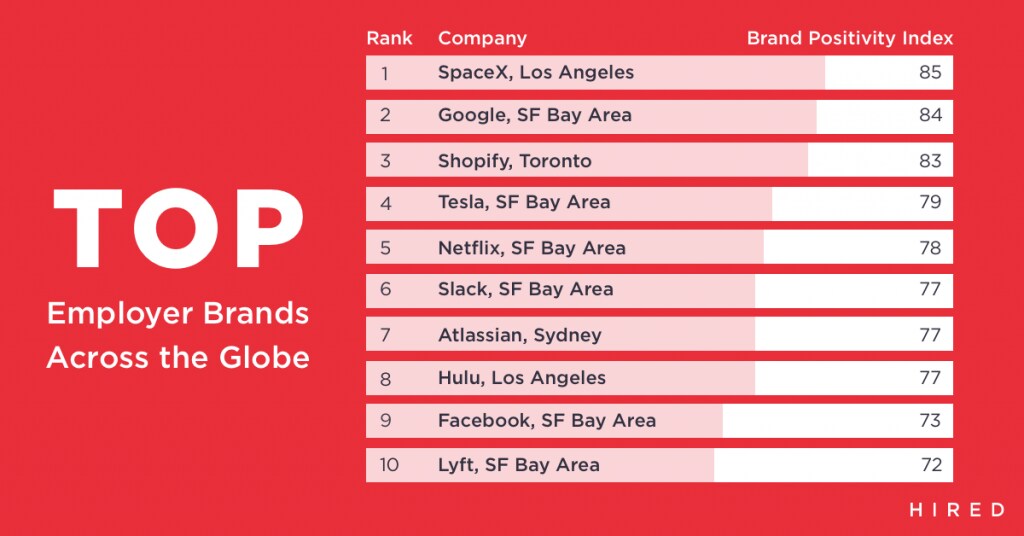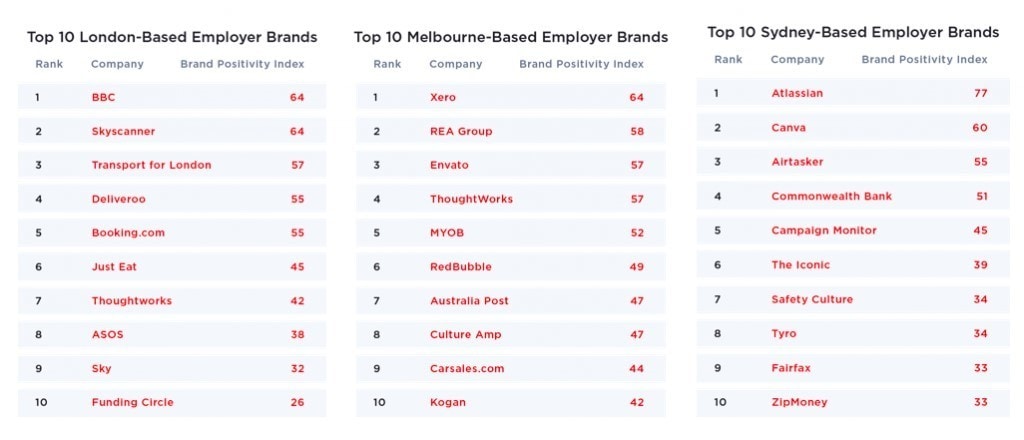These are the tech companies people most want to work for

A survey by recruitment website Hired asked which companies they wanted to work at internationally and locally. Image: REUTERS/Dan Anderson
Money, opportunity, healthcare, kudos, colourful slides, comfy chairs, ping-pong tables…
Tech companies are offering a variety of inducements in their efforts to recruit the best talent in a competitive global market suffering from a shortage of qualified, experienced staff.
However, a recent study shows that executives hoping to land a perfect combination of attractive benefits are likely to find that no one package fits all.
A survey of 2,349 tech professionals by recruitment website Hired, published in October, asked what applicants were looking for and which companies they wanted to work at internationally and locally.
While a decent salary topped the list of attributes most were after, it was not by any means the only motivation.

Global responses
Unsurprisingly, the global top 10 firms techies wanted to work for were mostly world-renowned names based in California, including SpaceX, Google, Tesla and Facebook.
The outliers were Toronto-based e-commerce platform Shopify and Atlassian, a software development company in Sydney.

The survey respondents lived in 15 tech hubs: Austin, Boston, Chicago, Denver, Los Angeles, New York, San Diego, San Francisco, Seattle and Washington DC in the US; London in the UK; Melbourne and Sydney in Australia; Toronto in Canada; and Singapore.
When it came to breaking down the regional results, Hired found some of the most favoured companies were relatively unknown or not typical “technology” companies.
Is biggest best?
Amazon, despite being an internationally recognized brand, did not make it into the global top 10, nor into the top slot for Seattle-based companies, despite having its headquarters in the US city: it came third, behind online property companies Redfin and Zillow.
In Chicago, Boeing took the number one slot, perhaps because of forward-looking investments attractive to workers, like buying Aurora Flight Sciences to develop autonomous planes that could one day operate as air taxis.

The most-favoured London companies were also outside the traditional tech scene, including the BBC, Transport for London, Deliveroo and travel platforms Skyscanner and Booking.com.
In Singapore, where travel fare website Agoda headed the local list of most-desired employers, nine of the top 10 were consumer tech companies covering travel, retail and food, possibly reflecting the sector’s high regional profile. Respondents in the city-state were also interested in global brands like Google, Facebook and Visa.
Techie exodus?
The survey also revealed some cities may suffer a future techie exodus. Although Chicago’s lower cost of living had once made it an attractive destination for those relocating from San Francisco and Seattle, over 80% of Chicago respondents now wanted to move away.
A similar number in Boston – where TripAdvisor headed the list of desirable employers – also wanted to work elsewhere, naming Puerto Rico or Colorado as future destinations.
Hired said the number of techies looking to leave these cities could mean an “exodus of talent”, although it pointed out many Bostonians did not care where they worked providing they could do so remotely.
Salary, reputation and benefits
Reasons why techies might not apply for work included a lack of interest in a company’s products or goals and a negative reputation, though again there were regional differences. Only a third of New Yorkers were concerned about companies with a “poor reputation”, compared to 60% of respondents in Chicago, Denver, Melbourne and San Francisco.
While salaries ranked highly with just over half of the respondents, this was lower than Hired had expected, with potential US applicants caring more about pay than those in London, Sydney and Melbourne.
Overall, however, learning new skills and finding a workplace culture they liked were almost equally important reasons why people would consider applying for a new job.

The changing nature of work
High pay alone will not be enough for talent looking to develop skills and corporate values that align with their own.
Being flexible is likely to be the key to solving tech recruitment problems, according to Hired, which also found 13% of companies were considering taking on more freelancers, up from 4% in 2015.
Given the global reach of IT and the flexibility workers desire, offering more remote working to new hires and extending this to existing staff would allow companies to expand their talent pool while giving employees the lifestyles they want in the places they prefer to live.
Hired’s results chime with other findings. In the UK, studies have found many workers – including men – have grown tired of the usual nine-to-five routine.
Businesses that can offer flexibility, career development, exciting projects and a strong commitment to corporate responsibility are likely to be the ones that will benefit the most.
Don't miss any update on this topic
Create a free account and access your personalized content collection with our latest publications and analyses.
License and Republishing
World Economic Forum articles may be republished in accordance with the Creative Commons Attribution-NonCommercial-NoDerivatives 4.0 International Public License, and in accordance with our Terms of Use.
The views expressed in this article are those of the author alone and not the World Economic Forum.
Stay up to date:
Emerging Technologies
Related topics:
Forum Stories newsletter
Bringing you weekly curated insights and analysis on the global issues that matter.
More on Emerging TechnologiesSee all
Dr Gideon Lapidoth and Madeleine North
November 17, 2025






